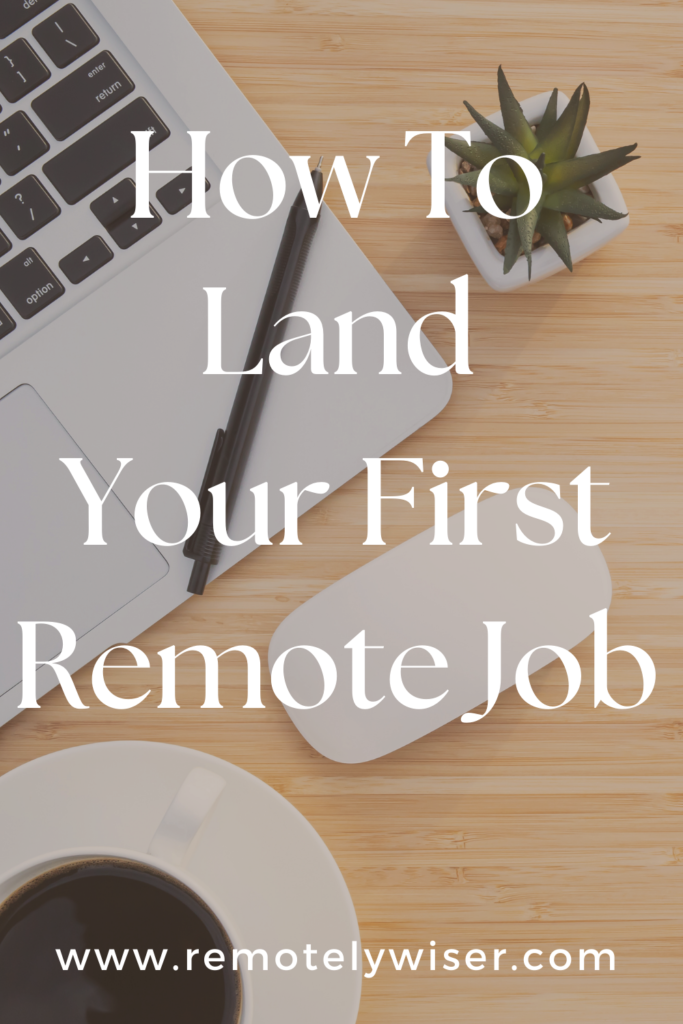Are you ready to land your first remote job? Sweet, you’re in the right place!
I’ve been working from home (WFH) for years and have been fortunate to experience the job search process as an interviewer and interviewee. By following the steps in this post, I’m confident you’ll find a job and join the virtual employment club soon!
If you’re still determining whether remote work is right for you, I suggest you check out this post first: 10 Things You Need to Know Before Becoming A Remote Worker.
Let’s dive in and get you on your way to landing your first remote job!
Determine what industry you want to work remotely in
You can find remote work in so many different industries, not only tech. Some other great options to consider are Media, Finance, Pharmaceuticals, Customer Service, and more.
You can find a list of the top industries embracing the remote business model at Remote.
Narrow down remote jobs that are a good fit for you
Job titles may vary slightly across companies depending on the industry. Review the job descriptions and see how your skills align with the job qualifications and responsibilities.
For example, if you’re looking for an entry-level role, some appropriate titles may include the words ‘assistant’, ‘coordinator,’ or ‘associate.’.
I suggest using LinkedIn and Indeed to find and apply for jobs.
Create a list of your applicable skills for a remote job
Even if you’ve never had a remote role before, you most definitely have transferrable skills that you should highlight on your resume. Some skills that you have and should highlight on your resume are the following:
- organization
- time management
- verbal and written communication
- self-motivated
- reliability
- flexibility
- independent problem solver
- adaptability
- computer operating systems (e.g., Microsoft, Apple)
- video conferencing platforms (e.g., Microsoft Teams, Zoom)
Identify any gaps in your knowledge and experience
Read through the job descriptions you are interested in and identify any areas of weakness. This is also a great exercise to prepare for the interview process.
Once you determine where the gaps are, figure out ways to improve those skills. For example, if you’re applying for a project lead role but have only been on a project team in a support role. Highlight the areas of the project that you successfully oversaw and delivered.
Tailor your resume to the job descriptions
Continually update your resume to include keywords from the job descriptions you are applying for. The best way to do this is to look at the primary duties, and then rephrase your resume experience to align with them.
If you need a clean and professional resume template or more guidance on updating your resume. Another post covers this in more detail: Create A Resume That Lands You Interviews.
Apply to (many) remote jobs
Finding a job is a numbers game. Only applying to a couple of your ‘dream’ companies is not a good approach – unless you have solid connections there.
No matter how qualified you may look on paper, there are often so many applicants to filter through that many companies have resorted to automation tools that sort for only the best-match applications. Again, tailoring your resume and experience keywords is crucial!
Sometimes (especially in today’s economy), business needs change, and companies decide to no longer pursue a job opening. So best to apply for as many as possible.
If you need to land a role quickly, applying to at least five jobs daily is a good rule of thumb.
Practice your interview skills
Stay ready, so you don’t have to get ready.
Even if you have not heard back from any companies yet, it’s a good idea to start preparing yourself in anticipation of the interview process.
I recommend searching Glassdoor for the companies and job titles you applied. There’s a lot of good information about their interview process and common interview questions.
Your interviews will likely be virtual if you’re applying for remote jobs.
Lastly, don’t give up on finding your first remote job!
Landing your first remote job takes time and persistence. Keep applying, and eventually, the right job will find you!
You may receive a no or two, but don’t let that discourage you. That’s all a part of the process. Continue to learn from it, refine your resume, practice your interview skills, and, most importantly, enjoy the journey.
In the comments below, tell me any challenges you’re having in finding a remote job. Let me know if there’s anything else you’d like to see covered.


